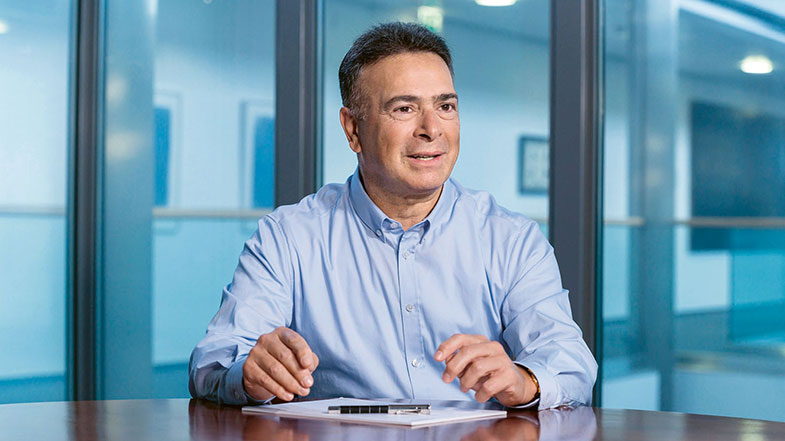Two and one-half years of the coronavirus pandemic, with limits on production capacity, followed by disruptions in supply chains, and now the war in Ukraine: How is Freudenberg coping with all this? “Even in the crisis, we are maintaining our course,” said Dr. Mohsen Sohi, CEO, in an interview with Freudenberg Magazine.
These are challenging times. How would you assess the global economic situation?
The pandemic has hurt the economy over a longer period than expected. Its direction is still unpredictable. The last few months in China have demonstrated this. Since the start of the year, we have been dealing with major raw material bottlenecks, difficulties with deliveries, and extraordinary fluctuations in demand from our customers. Energy and raw material prices have risen more sharply than expected. The war in Ukraine has intensified the situation all over again. The war and sanctions are disrupting global supply chains – with massive geopolitical effects and negative consequences for the global economy. Inflation is currently the greatest challenge economically. Since the start of 2021, we have had to spend more than a half billion euros at Freudenberg to cover increases in energy and raw material prices. Inflation rates are rising as the economic outlook stagnates. Some economies are approaching stagflation – a combination of rising prices and a slowing economy. And then there is the severe shortage of skilled employees. Freudenberg now has more than 3,000 open positions.
How is Freudenberg faring in this difficult environment?
Despite all these challenges, we have held our ground so far. Freudenberg is a strong and healthy company, but rising procurement costs are weighing heavily on our financial results. There are great uncertainties, and they have become even greater due to the war in Ukraine. Given all this, we are assuming only limited business growth for all of 2022.
Our technological expertise and capacity to innovate are crucial. More than 32 percent of our products are less than four years old.
To what do you attribute the company’s stability?
Thanks to our successes over the past few fiscal years, we can continue to invest at a high level in research, development and new technologies. This is creating the foundation for our long-term success. Our technological expertise and capacity to innovate are crucial. More than 32 percent of our products are less than four years old. Our broad diversification and global positioning also reduces our dependence on individual sectors, raw materials, technologies and regions.
Long-term thinking is considered one of Freudenberg’s hallmarks. Is this still the case in times of crisis when agility is in demand?
One doesn’t exclude the other. Freudenberg adopts measures for the long-term yet is flexible in its operations at the same time. Even in times of crisis, we are maintaining our course. We continue to invest heavily in the mobility of the future, in battery, hydrogen and fuel cell technologies, along with high-tech components for electric vehicles. Digitalization and automation, as well as sustainability and climate protection, are still long-term strategic focuses as well. In the field of digitalization, we are concentrating on services that increase internal efficiency or provide customers with added value. We are introducing a Group-wide sustainability reporting system so we will be able to measure our progress in sustainability precisely and verifiably. That means our activities can be examined and audited by independent institutes.
We have learned how important it is to have highly competent employees in every region of the world.
The Covid-19 pandemic has accelerated digitalization, especially when it comes to cooperation and communication at Freudenberg, among other companies. What lessons has Freudenberg drawn from the pandemic?
The pandemic has shown us that we still have to improve our global positioning. We have learned how important it is to have highly competent employees in every region of the world. They can make high-quality decisions on a decentralized basis, adapted to particular regional and local circumstances. So we have to build even more specialized and management expertise. We need outstanding know-how and specialized knowledge in every region. Our basic goal is to balance out the proportions of our business in individual regions to a greater degree, with similarly sized contributions to revenue from Europe, America and Asia. At the same time, this helps us shorten our supply chains. The longer they are, the more difficult they are to manage. We want to manufacture selectively for the respective market and the customers there.
In light of the war in Ukraine, how will Freudenberg conduct business in Russia in the future?
Due to the war, we have decided to pull out of the Russian market. We will terminate our business activities there in an orderly process and in accordance with legal requirements.
How will Freudenberg shape its business in China?
We are currently reevaluating our activities in China. Amid a period of powerful economic upheaval around the world, we are seeing a competition between the United States, China and Europe. This raises the question: Is China a partner, opponent or competitor? Will our work with China be cooperative or confrontational in the future? We are currently evaluating trends in China with our Dragonfly project and the effect they have on our activities there. One thing is already certain: The business environment for Western companies in China won’t be any less complicated in coming years.
This interview was conducted by Michael Scheuer, Head of Corporate Communications, Freudenberg & Co. KG.
